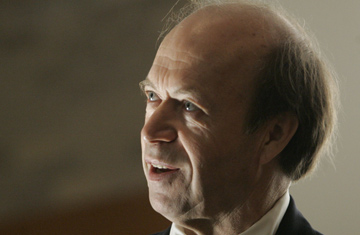
Jim Hansen is truly in the inconvenient-truth business. He directs NASA's Goddard Institute for Space Studies, where his team researches the physics and forecasting of climate change. On a hot day in June 1988, Hansen became the first leading scientist to explain global warming to the U.S. Congress and the American people. His warnings proved to be accurate and prescient. Over the subsequent two decades, Hansen's concerns for the world's future have only mounted, eventually putting him on a collision course with a do-nothing Bush Administration. When Hansen claimed that White House junior lackeys with no scientific training tried to muzzle him in 2005, he did so in the full knowledge that his job might be in jeopardy in an Administration where science had become highly politicized. He bravely and successfully defended his freedom to speak out. The simple truth, inconvenient as it was for the Administration, is that Hansen had the science firmly on his side.
Hansen is especially worried now about "positive feedbacks" that can vastly accelerate today's gradual climate changes, leading to a sudden breakup of the great ice sheets of Greenland and Antarctica and a massive and rapid rise in the sea level. He has therefore recommended a fast and decisive shift to a new sustainable economy with much lower emissions of carbon dioxide and other greenhouse gases. His fortitude has made him not only a great scientist but also a great scientist-statesman, one who plays a unique role in helping all of us understand the enormous risks of man-made climate change.
Jeffrey Sachs is director of the Earth Institute at Columbia University, a partner of the NASA Goddard Institute for Space Studies